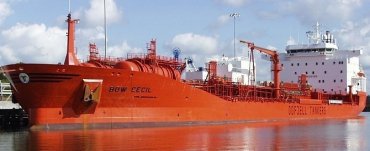
The Tanzanian Bureau of Standards revved up its crackdown on substandard lubes, demanding two reshipment orders in two weeks.
Rhoida Andusamile, public relations officer for the TBS, noted that the agency refused on Dec. 31 to allow one base oil shipment to enter the country because it did not meet the countrys requirements for stocks used to blend finished lubricants. I can confirm that TBS handed out the order of reshipment to Hass Petroleum on 16,000 metric tons of base oils because it did not meet the minimum standard for the local lubricant market, Andusamile said during a phone interview.

Photo courtesy of Odfjell
The Tanzania Bureau of Standards is stepping up its monitoring of lubricant and base oil imports.
The base oil that Haas imported was from the United Arab Emirates. Two weeks earlier, the bureau had interrupted the unloading of 37,500 metric tons of substandard petroleum products from aboard MT Ridgebury John B, a vessel said to have originated from Nigeria, for failing to meet minimum quality standards for the local lubricant market.
George Morvey, industry manager for Parsippany, N.J.-based consultancy Kline & Co.s Energy Practice, lauded the Tanzanian governments effort.
I must say I am impressed with the efforts of government and industry to collaborate their efforts to combat and thwart the activities of suppliers of substandard and counterfeit base stocks and finished lubricants into Tanzania and other country markets on the continent, Morvey told Lube Report. It is the governments duty, supported by the legitimate lubricants industry players, to deal with this head-on and eliminate it before more damage is done.
Peter S. Hermes, managing director for Tanzania Mines, Gas and Oil Ltd., said competition and low growth on the Tanzanian lubricant market could be responsible for some stakeholders opting for a risky route to profitability by importing substandard base oils into the country.
Morvey, who noted that end users are at the receiving end of substandard lubricating oils, asserted that, Exporters must learn, most notably through heavy fines and penalties, that the continent can no longer be the dumping group of substandard products.
Hermes disagreed, arguing that it is not viable banning people who import substandard lubes because every country needs investors.
Andusamile said Hass Petroleum was not fined because it already incurred loss for reshipment, which she said will serve as deterrent to would-be offenders.
Irfan Khan, general manager for Tanzanian Based General Petroleum, said blenders in the country are still reviewing the situation and arranging to meet with the Tanzania Bureau of Standards about the enforcement campaign.
While the TBS crackdown continues to elicit support, the autonomous archipelago enclave of Zanzibar remains a conduit for substandard lubricants and base oils because authorities find it difficult to police
It is difficult to contain the substandard lubes oils entering Tanzania from Zanzibar because they have their own Bureau of Standards, Andusamile said. That is why we have been talking to them to adopt Pre-shipment Verification of Conformity to standards, because some unscrupulous Tanzanian businessmen are using Zanzibar as a conduit for importing substandard lubes into Tanzania.
On Feb. 1, 2012, the bureau implemented the Pre-Shipment Verification of Conformity regulation in partnership with three global inspection and certification services firms: SGS, Intertek, and Bureau Veritas. The regulation mandates that the three inspection firms certify that every lubricant product, including base oils and finished lubes, complies with the Tanzanian national standards before being imported into the country.